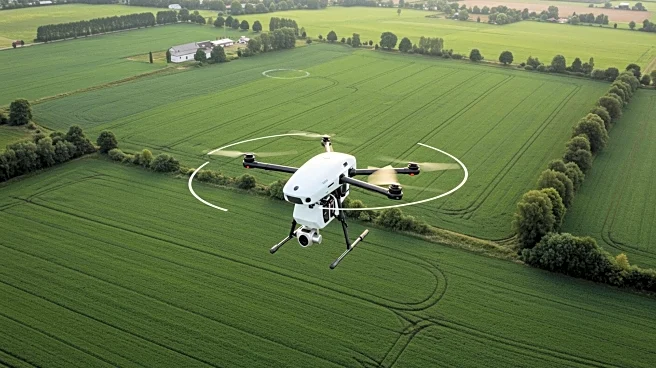What is the story about?
What's Happening?
Precision agriculture is emerging as a crucial strategy to address fertilizer runoff, a significant environmental issue in modern agriculture. In 2025, precision agriculture techniques are reported to cut fertilizer runoff by up to 40%, thereby safeguarding crops and waterways. This approach involves using technology-driven methods to optimize the use of inputs such as fertilizers, water, and seeds on a site-specific basis. The misuse or excess application of fertilizers leads to runoff, which contributes to global water pollution, soil degradation, and ecosystem imbalance. Rising fertilizer prices and increasing regulatory oversight are pressuring farmers to balance productivity with environmental health. Precision agriculture offers solutions by enabling farmers to apply the right amount of inputs at the right place and time, reducing excess nutrient loading and minimizing the risk of runoff.
Why It's Important?
The significance of precision agriculture lies in its ability to address both economic and environmental challenges faced by the agriculture sector. With escalating fertilizer prices, precision agriculture provides a means to reduce costs by preventing overapplication and loss, delivering 20-30% input savings. This is crucial as farmers navigate volatile global markets and supply chain disruptions. Environmentally, precision agriculture minimizes nutrient losses, reducing the risk of eutrophication and improving water quality. It also supports compliance with stricter environmental regulations, helping farmers avoid fines and penalties. By enhancing nutrient use efficiency and reducing runoff, precision agriculture contributes to sustainable farming practices, aligning with global sustainability goals.
What's Next?
As precision agriculture continues to evolve, advancements in AI algorithms and IoT sensors are expected to further enhance its effectiveness. These technologies will allow for hyper-customized input recommendations and ultra-responsive management systems. Blockchain-based compliance will support transparent reporting for regulatory bodies, boosting accountability. The integration of resource optimization tools will amplify the benefits of precision agriculture, making it indispensable for balancing productivity and environmental health. As the agriculture sector adapts to rising input costs and environmental pressures, precision agriculture is set to play a foundational role in sustainable fertilizer management.















